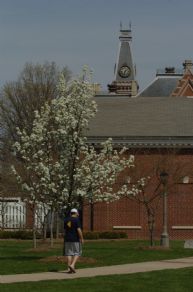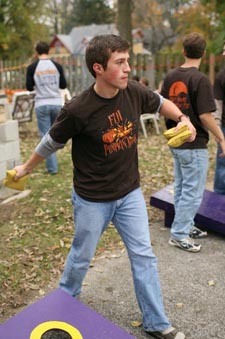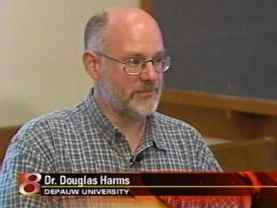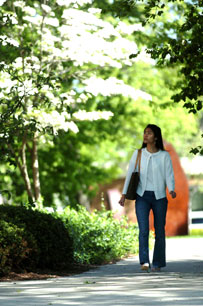Seth Elder '08 to Research Economic Development and Cultural Heritage in Macedonia with Fulbright Award
June 6, 2008
-224x311.jpg) June 6, 2008, Greencastle, Ind. - Seth C. Elder, a May 2008 graduate of DePauw University, will spend the 2008-09 academic year studying and conducting research in Macedonia as a Fulbright Scholar. Elder's project, "Economic Development and the Protection of Cultural Heritage in Macedonia," will be complemented by coursework at the Institute of Anthropology and Ethnology (IEA) at Sts. Cyril and Methodius University in Skopje. His experience will be made possible by an international graduate study and research grant through the Fulbright U.S. Student Program competition.
June 6, 2008, Greencastle, Ind. - Seth C. Elder, a May 2008 graduate of DePauw University, will spend the 2008-09 academic year studying and conducting research in Macedonia as a Fulbright Scholar. Elder's project, "Economic Development and the Protection of Cultural Heritage in Macedonia," will be complemented by coursework at the Institute of Anthropology and Ethnology (IEA) at Sts. Cyril and Methodius University in Skopje. His experience will be made possible by an international graduate study and research grant through the Fulbright U.S. Student Program competition.
Four members of the DePauw community have received Fulbright Awards for the coming academic year. Elin P. Raun, a 2004 graduate of the University, will travel to Estonia for a research project, "The Return of Estonia's Diaspora." Eric M. Reese, a May 2008 graduate of DePauw University, will spend a year in South Korea teaching English to young people. Michele T. Villinski, James W. Emison III Director of the Robert C. McDermond Center for Management and Entrepreneurship and associate professor of economics and management at DePauw University, will have the opportunity to spend the upcoming year teaching environmental and natural resource economics and policy at Universitas Surabaya (UBAYA) in Surabaya, Indonesia.
"My project explores the complex relationship between economic development and the protection of cultural heritage in the context of a recovering economy," says Elder, who majored in Latin at DePauw. "I will use Macedonia as a case study to determine the role that cultural heritage issues play in tourism and economic development, and how the protection or development of heritage immediately impacts the local population."
In his application for the Fulbright Award, Elder noted that he began his research in earnest while studying abroad as a DePauw student. His experiences include a semester spent at Hertford College, Oxford University. He also participated in a five week tour of archaeological sites led by a Kansas University professor, and spent his 2006 Winter Term with DePauw Professors Pedar Foss and Rebecca Schindler traveling throughout the Bay of Naples, Paestum, Pithekoussai, and Capri for a project, "The Art and Archaeology of Pompeii and the Bay of Naples." Last fall, 
"The protection of cultural heritage has become an important issue on the world stage, in no small part due to the potential revenue generated by tourism at heritage sites," he stated to the Fulbright committee. "While such economic benefits are easily realized by developed nations with stable economies and infrastructures, developing and recovering nations are in a far more difficult situation. Scarce governmental resources are needed for basic services, and the protection of cultural heritage is therefore often neglected. In addition, widespread poverty increases the likelihood of looting for profit at heritage sites, destroying any archaeological context for the objects removed, and damaging sites irreparably. Such is the case in Macedonia, where a particularly rich Classical and Byzantine heritage is being continually plundered."
The May graduate will spend the next academic year analyzing "the state of cultural heritage in Macedonia at this critical juncture when a clear commitment to protection exists, despite pressing economic concerns. I first intend to investigate the extent to which Macedonia's heritage protection efforts (both public and private) are enacted with commercial benefits in mind. Having determined this, I will investigate both the short and  long-term economic effects these projects have on local communities. My goal is to analyze the effects of cultural heritage protection not only in relationship to site preservation or the national economy, but also in order to understand the direct effect of such efforts on local communities."
long-term economic effects these projects have on local communities. My goal is to analyze the effects of cultural heritage protection not only in relationship to site preservation or the national economy, but also in order to understand the direct effect of such efforts on local communities."
Elder, who hails from Rising Sun, Indiana, added, "My motivation for conducting this project stems from my intense personal and academic interest in the field cultural heritage studies," noting that the issues of economic development and heritage protection were the subjects of his senior Honor Scholar thesis at DePauw. "While the economic and academic aspects of development and protection can be analyzed in a scholastic setting, actual fieldwork is necessary to assess the impact of such projects on local communities."
Elder's application concluded, "I will gain invaluable practical experience in heritage protection, which will prepare me for a master's degree in cultural heritage studies.  My ultimate goal is to earn a J.D. with a certification in art law and continue to work in issues of cultural heritage preservation. Moreover, I believe that a systematic analysis of the state of heritage protection and development in Macedonia with regards to the effects on local communities will be of great benefit to the Macedonian academic community and to heritage protection in developing and recovering economies at large."
My ultimate goal is to earn a J.D. with a certification in art law and continue to work in issues of cultural heritage preservation. Moreover, I believe that a systematic analysis of the state of heritage protection and development in Macedonia with regards to the effects on local communities will be of great benefit to the Macedonian academic community and to heritage protection in developing and recovering economies at large."
"Seth is both intellectually curious and methodical in his thinking," says Douglas E. Harms, professor of computer science at DePauw and the University's Fulbright Program Adviser. "He takes on difficult challenges and he sets his standards high. Brave, ambitious, and independent, he understands the value of cultural heritage sites while also recognizing economic realities of the people who live in surrounding communities.'
The professor continues, "A central goal of his project is to benefit local populations who are often forced to choose between preserving cultural sites and building much needed infrastructure. His interest in people's lives and his  understanding of the scarcity of resources will make him an excellent ambassador. Articulate and at ease in conversations about both antiquity and contemporary culture, Seth will adapt well to University life and to local communities in Macdeonia. His calm, witty and thoughtful manner suggest that he will make strong connections with Macedonians, and that he is well-equipped to handle difficult situations, should any arise."
understanding of the scarcity of resources will make him an excellent ambassador. Articulate and at ease in conversations about both antiquity and contemporary culture, Seth will adapt well to University life and to local communities in Macdeonia. His calm, witty and thoughtful manner suggest that he will make strong connections with Macedonians, and that he is well-equipped to handle difficult situations, should any arise."
Sponsored by the U.S. Department of State, the Fulbright U.S. Student Program is the largest American international exchange program offering opportunities for students and young professionals to undertake international graduate study, advanced research, university teaching, and teaching in elementary and secondary schools worldwide. The U.S. Student Program currently awards approximately 1,500 grants annually in all fields of study, and operates in more than 155 countries worldwide. Fulbright full grants generally provide funding for round-trip travel, maintenance for one academic year, health and accident insurance and full or partial tuition. Since its inception in 1946, the Fulbright Program has provided more than 286,000 participants, chosen for their leadership potential,  with the opportunity to observe each others' political, economic and cultural institutions, exchange ideas, and embark on joint ventures of importance to the general welfare of the world's inhabitants. Learn more by clicking here.
with the opportunity to observe each others' political, economic and cultural institutions, exchange ideas, and embark on joint ventures of importance to the general welfare of the world's inhabitants. Learn more by clicking here.
To contact Dr. Harms, the recipient of a Fulbright Award for the 2004-05 academic year, send an e-mail to dharms@depauw.edu.
DePauw was among the "Top Producers of Fulbright Awards for U.S. Students, 2007-08" according to a chart published in the October 26, 2007 edition of the Chronicle of Higher Education. The University continues to be one of the top colleges in the United States for the percentage of students who study abroad, states Open Doors 2007, a report by the Institute of International Education.
